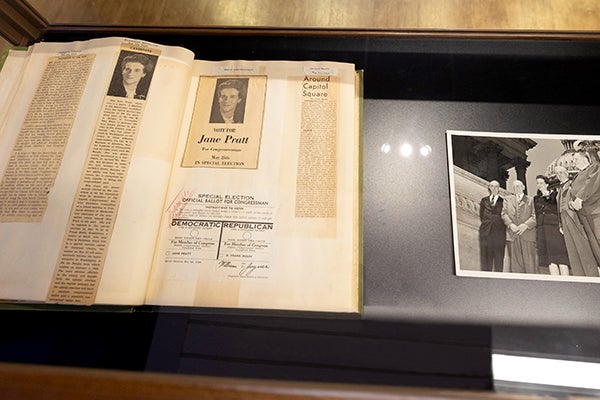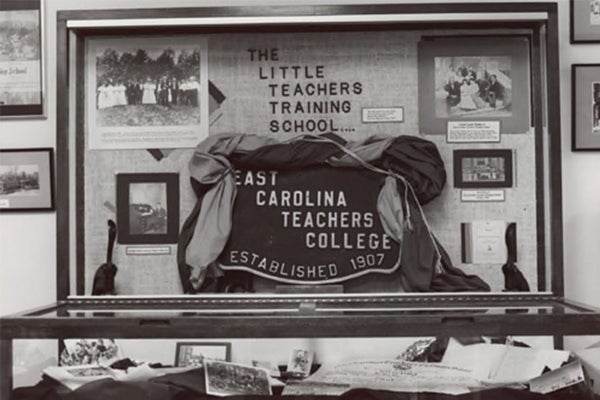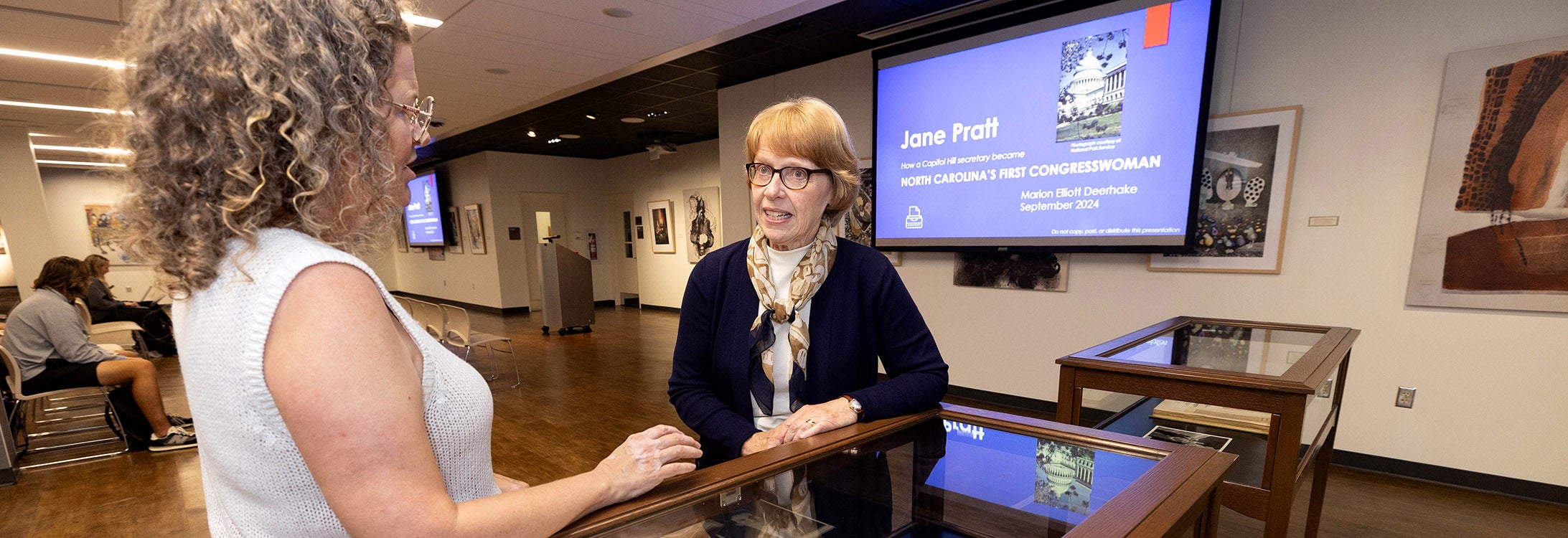Library’s special collection of resources
A biography written about North Carolina’s first congresswoman, Jane Pratt, might not have been possible without East Carolina University’s Special Collections.
Author Marion Deerhake used a plethora of sources to research and chronicle the breakthroughs by her distant cousin, Pratt, who was elected as the state’s first congresswoman in 1946. Deerhake noticed a reference to ECU library scrapbooks on Pratt’s biography page on the U.S. House of Representatives website.
Patience was then required as Deerhake reached this point in the writing process.
“I went to East Carolina’s website and found materials in Special Collections, so I thought that I need to get down there,” said Deerhake, who lives in Raleigh, during a recent author talk and reception held at ECU’s main campus library. “But of course, this was 2020, and the library was closed because of the pandemic. I waited patiently and tried to do some other work along the way. Finally, when things were safe again, I came down and spent a lot of time down here going through the collections. ECU’s Special Collections team was extremely helpful as I conducted my research for my manuscript to publish.

Materials from Jane Pratt’s scrabooks are encased in the library, including a 1946 North Carolina election ballot.
“Jane Pratt’s scrapbooks, held here at ECU, were an essential source of information as I wrote the biography.”
ECU’s Special Collections consists of five categories. Collection materials in those categories — manuscripts, rare books, digital collections, university history and records, and the North Carolina collection — help document the history of ECU, the state and the region.
“The ECU Special Collections is our priceless gem,” said Dr. Karin Zipf, professor in the Department of History. “As a historian, I understand that our preservation of the past rests on archival collections such as ours. It is imperative that we advance our understanding of our region’s, state’s and nation’s heritage by preserving and using this collection. As a historian, I have gained great familiarity with the collection in the past 23 years of my teaching and research at ECU. I have used the collections for my own research, and I have guided students there frequently.”
Deerhake’s book adds to the positive experience authors have enjoyed while visiting an ECU library for research. Author award events are held annually on main campus at ECU and the Health Sciences Campus.
“We are always delighted when scholars use the unique materials in our collections to further their research and to contribute to books that they are writing,” said John Lawrence, assistant director for Special Collections for Academic Library Services. “Providing evidence and documentation of the history and culture of eastern North Carolina is one of the chief goals in building our manuscript and rare book collections. Each publication brings welcome attention to our collections and the resources that we provide for research.”
Pratt was one of 11 women in the 1946 U.S. House of Representatives. North Carolina did not elect another woman to the House until 1992.
Deerhake used Pratt’s archived scrapbooks of correspondence, newspaper clippings and photographs at ECU to help write the book.
“I thought ECU’s collections were extremely accessible and easy to work with,” Deerhake said. “Everyone was so accommodating.”
Special Collections breakdown

East Carolina University’s Special Collections is divided into five units:
North Carolina Collection
For historical publications, especially related to eastern North Carolina, this collection includes state and colonial government documents, county records, maps, rare books, current magazines and periodicals, and historical newspapers.
University History and Records
This is the final, central repository of ECU records of permanent historical value, including documents created by administration, offices, colleges, departments, student groups and faculty members, as well as items from alumni about their time as a student.
Manuscripts Collection
This collection preserves various unpublished materials, such as letters, family photos and oral histories, and is strong in history of North Carolina and the tobacco industry, American naval, maritime, and missionary history, and 20th-century American literature.
Rare Books Collection
The rare books collection contains published works from the 1500s to the present. It features travel accounts, maps, North Carolina imprints and artists’ books.
Digital Collections
Some Special Collections material has been scanned and is available online in the library’s Digital Collections. Digital Collections also include material from other ECU libraries and museums, as well as digital exhibits on university and local history.
